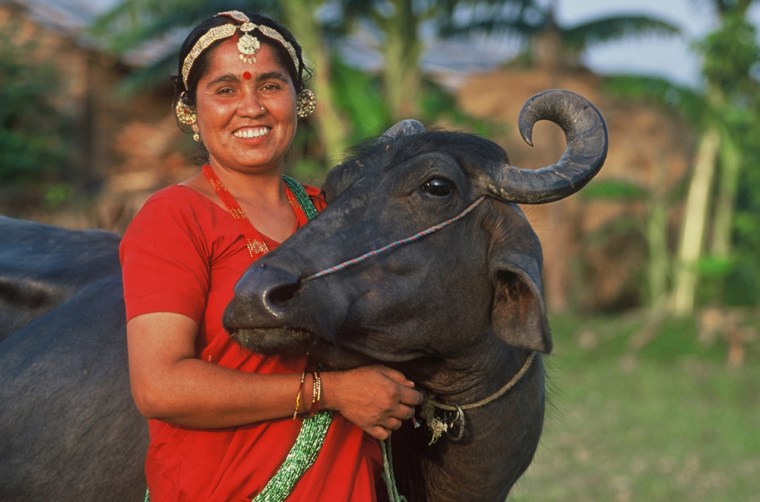Instead of waiting in line with hundreds of others for a chance at nabbing the year’s hottest Christmas gifts, Food Network chef Alton Brown decided on an intangible alternative for the people on his list — a donation to Heifer International.
Brown is on a growing list of donors who give to the Little Rock-based charity at the holidays after finding that, sometimes, the perfect gift for the person who has everything is to give them nothing — except the satisfaction of knowing money was spent to help poor people worldwide.
“If I can get a couple of cows in Russia, bees to people in Kentucky, or a couple of flocks of geese to folks in China, that actually matters and I feel really good about it,” Brown said from his Atlanta office at Be Square Productions, the company that produces his “Good Eats” show for the cable television network.
Heifer International works in 50 countries to provide animals ranging from snails and silkworms to elephants and water buffalo. The charity’s goal is to provide the livestock to needy families so they can produce a product, such as milk or silk, and support themselves. Recipients are required to give some of the animals’ offspring to neighbors to pass on the gift.
The communities where Heifer works choose recipients typically through a democratic process, said Ray White, a spokesman for the organization. “Sometimes they’ll pick families that are ready first, that have most developed food security system for the animals,” White said.
Charity has roots in Spanish Civil War
The 62-year-old organization began when Dan West formed Heifers for Relief after working as a Church of the Brethren relief worker handing out rations of milk to children during the Spanish Civil War.
West thought that providing families with livestock and training would help them provide for themselves and not have to depend on others for food. So in 1944, the first shipment of 17 heifers left York, Pa., bound for Puerto Rico.
White said that Heifer has “denominational partners” on its 15-person board, but is not affiliated with any religious organization. The charity now has a list of 7,000 corporate donors.
Be Square Productions donates a Gift Ark every year — a $5,000 donation that includes two each of Heifer’s animals, including cows, sheep, camels, oxen, water buffalo and rabbits, among many others. The animals go wherever they are needed most.
Brown donates money himself and in the names of his clients. Many times, he said, the people in whose name the donation was given are honored when they receive the gift card explaining that others will benefit from the money.
“I think a lot of people realize ’We’ve got a lot,”’ Brown said. “And it’s not that they don’t need anything, but this gift actually has meaning. We tell them the earth is going to be a better place in your name.”
For Victoria Faust, 17, a personal decision to donate to Heifer turned into a larger project that involved her mother’s chiropractic business and the generosity of her mother’s patients.
Faust, from Madison, Ga., decided in 2004 that she would solicit donations for Heifer at Christmas from friends and family, with hopes of raising enough money to buy a Gift Ark. She raised $3,000 that year, but wanted to do more.
Teen organizes chiropractic drive
In September 2005, Faust wrote a three-page letter and sent it to the 500-plus clients at her mother’s clinic, Family Chiropractors. Faust also approached local schools about donations.
On Christmas Eve, the chiropractic clinic hosted a fundraiser for Faust’s project: any patient needing an adjustment could come in — as long as the money was given to Heifer.
Faust ended up with nearly $10,000, or enough for two Gift Arks.
“I was totally shocked when the checks started coming in,” Faust said. “It was really inspiring to find out that all these people in my community were willing to pitch in and help.”
Heifer’s concept of their clients’ self-reliance is what attracted Brown and his wife, DeAnna, to the charity while researching organizations to which they could donate, he said.
The couple spent more than a year researching different charitable organizations that were in sync with their values where they could donate some of the corporate money, Brown said. And Heifer seemed to keep popping up in their research.
“We like the way the organization is run from a business standpoint,” Brown said. “I’m very big on self-reliance — moving people who are currently locked up in poverty to self-respect and using animals to do it.”
‘It was like somebody ringing a bell’
Former UPS Chief Executive Officer Kent “Oz” Nelson and his wife, Anne Starr, had donated to Heifer for the past four years at Christmas, but decided to give strictly Heifer gifts to friends and family last year.
Starr said the family collected money that they had budgeted for material gifts for a donation to the charity.
“What I think is good about it is so often we give gifts and we do them out of a sense of obligation,” Starr said. “I just got to thinking about how many times I buy at Christmas especially when I know good and well I buy something that people don’t want or need. It was like somebody ringing a bell saying ’Hello, here’s another thing you can do at Christmas.”’
Nelson also decided to pass Heifer gifts along to his grandchildren, who receive a Heifer gift card in their stockings every year. He and his wife hope it will inspire the next generation to follow Heifer’s philosophy of passing on the gift.
“We have so much and it’s really our responsibility to give other folks a hand up,” Starr said. “For a small amount of money that I can say I did something that will help somebody in a very significant way.”
